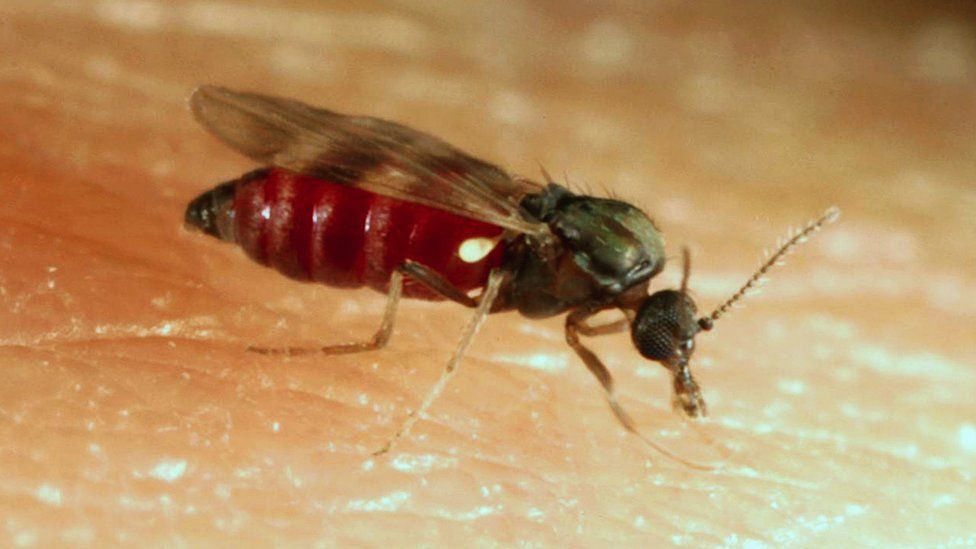Bluetongue farm virus warning for sheep and cattle as midges blown into UK
- Published
- comments

Infected culicoides midges blown over from northern Europe can infect livestock with one bite
A new strain of an animal disease that could have a devastating impact on livestock farmers looks set to spread across England, experts have warned.
The government said there is a "very high probability" bluetongue virus will be more widely spread by infected midges blown over from northern Europe.
There have been 126 cases on cattle and sheep farms in England. The virus does not affect people or food safety.
Farmers are calling for a vaccine to be developed quickly against the strain.
Last week, one vaccine was given emergency approval in the Netherlands, where there have been more than 6,000 cases of the new strain, known as BTV-3.
Farmer Roger Dunn had an outbreak on his farm at the end of 2023
A spokesperson for the Department for Environment, Food and Rural Affairs (Defra) said the government was "actively engaging" with vaccine manufacturers on the development of a BTV-3 vaccine for use in the UK.
The virus can see around 30% of a sheep herd lost, although the mortality rate is lower with cattle.
The disease causes tongue and mucous membrane lesions, problems with swallowing, lameness and stiffness, affecting animal welfare and leading to a reduction in milk yields.
Kent farmer Roger Dunn, who farms 400 cattle and 1,200 sheep, had an outbreak of bluetongue shortly before Christmas, despite a control zone with movement restrictions already being in place.
Bluetongue affects ruminants including sheep, in which it causes serious illness and death
The virus spread was contained on the farm by culling six cattle, for which he was compensated, and it did not spread to the sheep. But Mr Dunn knows the impact could have been far worse.
"When you could be losing 30 to 40% of your business, it is a big worry," he told the BBC.
"These are all pedigree Sussex cattle so that is years and years of breeding. You could lose a lot of bloodlines through it. You could lose your whole herd through it if it becomes a serious outbreak so it can be quite devastating. And, with the whole problem of movement and everything else, it just becomes a nightmare."
He added that, because his farm is in a known bluetongue area, some buyers are "very hesitant" to buy stock from him.
Midges 'everywhere'
Cattle farmer David Barton, who is chair of the National Farmers Union's (NFU) livestock board, said farmers were "anxious to protect their livestock" but that there were still questions over the vaccine approved in the Netherlands.
He said: "As this is a very new vaccine, there are still questions to be answered - not least about the cost of the vaccine, how it will be rolled out, and what support the government can offer to get it deployed quickly and efficiently."
Last year's outbreak was the first in the UK since 2007. Bluetongue can affect ruminants, such as sheep, cattle, goats and deer, and camelids like llama and alpaca.
The first case of the new strain was found in November and since then there have been 119 cases in cattle and seven cases in sheep across Kent, Norfolk and Suffolk. The most recent case was confirmed on 8 March.
Experts at The Pirbright Institute virus research centre are now studying exactly how the culicoides midges are spreading the disease.
Scientists at the institute are breeding colonies of midges to study how some types carry the virus while others do not.
Dr Marion England is studying tens of thousands of midges and how they carry bluetongue
Meanwhile, midge traps placed at 18 farm sites across the country are each providing tens of thousands of the biting insects in a night for the scientists to study and are acting as an early alert system to the presence of those midges which could transmit the virus.
Dr Marion England, who is overseeing the national surveillance of culicoides midges, explained: "The temperature that the midges become active at is lower than the temperature at which the virus can be transmitted so actually knowing the midges are up and running means a little while later we might see bluetongue transmission."
But she warned that, with midges "everywhere", controlling the spread of the virus would be difficult.
Dr England told the BBC: "It only takes one midge bite to transmit the virus so one infected midge can bite an animal once and that animal will have a fully developed infection."
Dr Carrie Batten, head of the national reference laboratory for bluetongue, warned farmers to "be vigilant" and to look out for any clinical signs in their livestock to help the institute spot an outbreak as early as possible and take necessary measures.
"As this is an insect-borne disease, it is very easy for an escalation in terms of numbers of positive animals in the field," Dr Batten said.
She added that the laboratory was already looking to scale up its response to be able to test about 2,000 farm samples a day and give farmers their results within 24 hours.
A spokeswoman for Defra said the government was actively monitoring the situation, external and reviewing its current bluetongue virus control strategy.
Bluetongue is a notifiable disease so anyone suspecting the disease must report it to the Animal and Plant Health Agency (APHA), external.
Related Topics
- Published19 February
- Published18 January
- Published27 November 2023